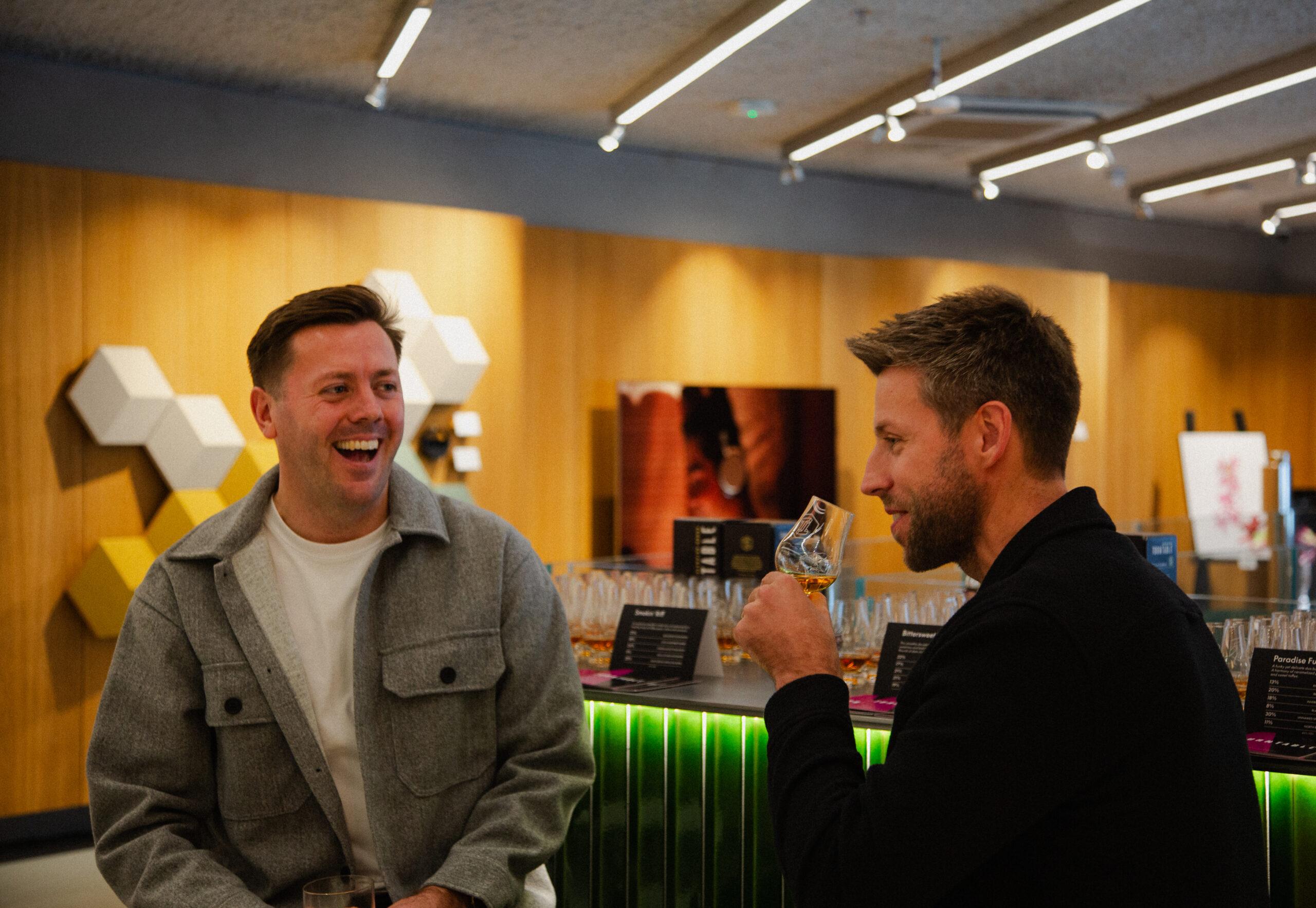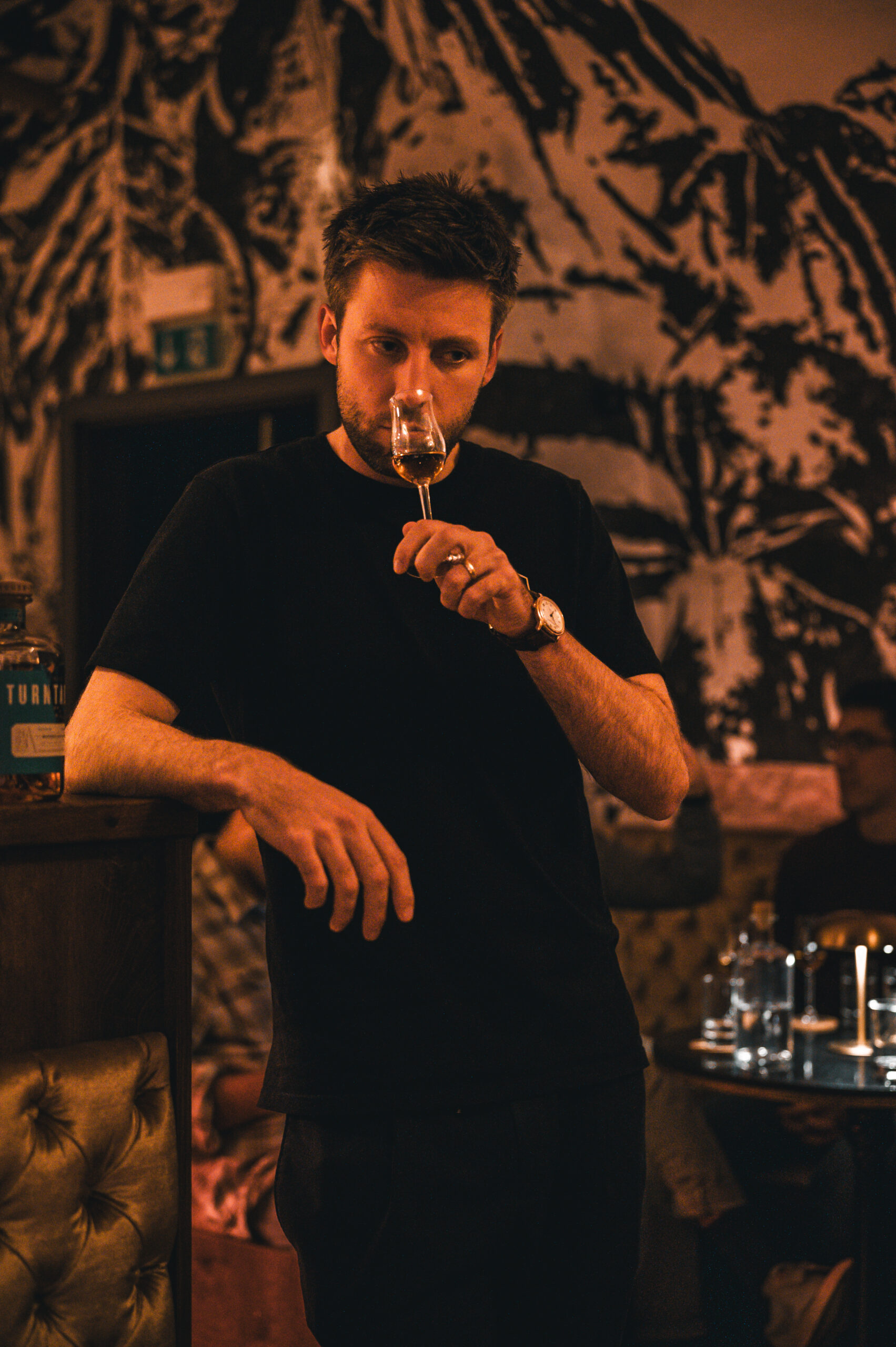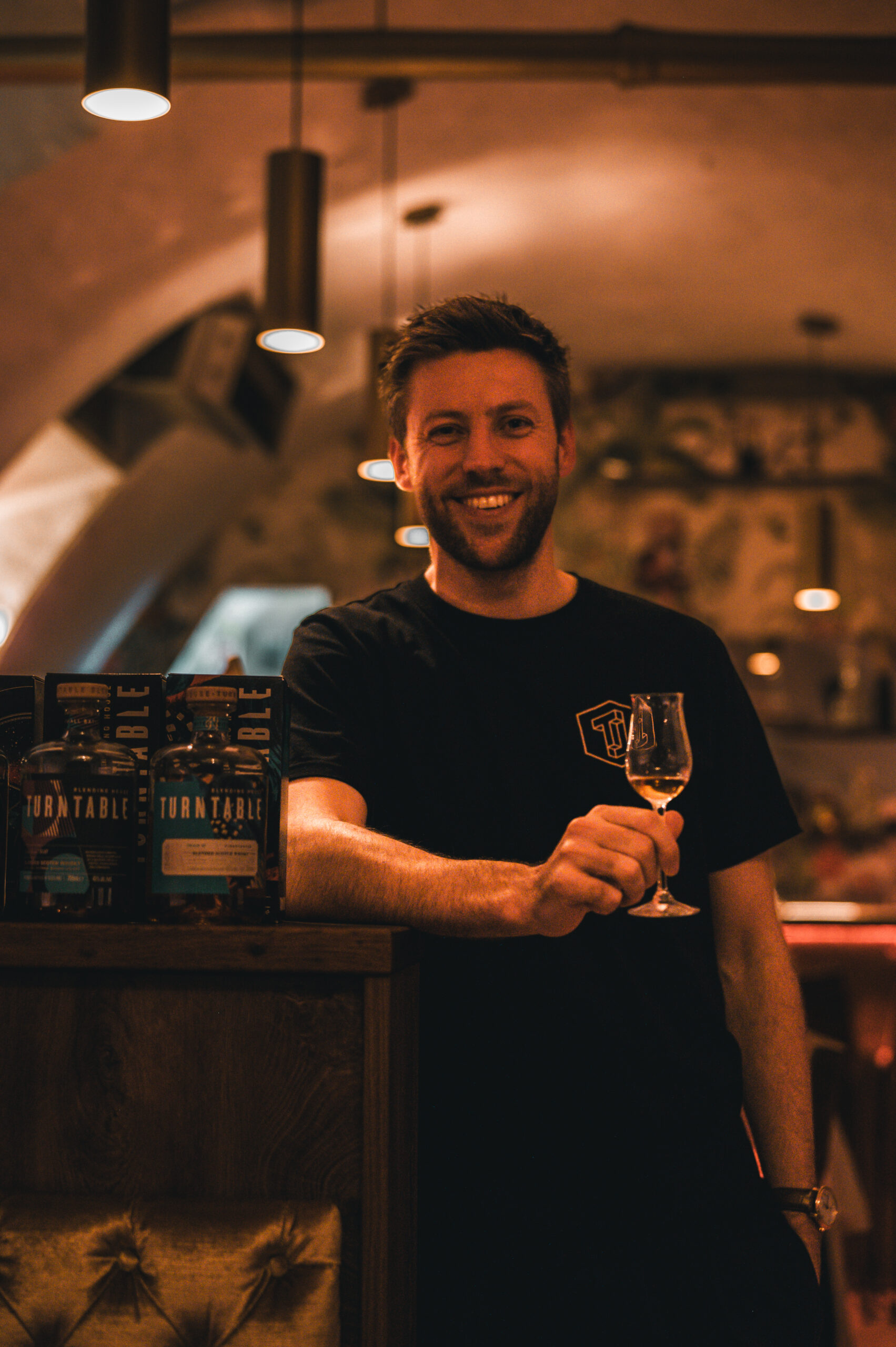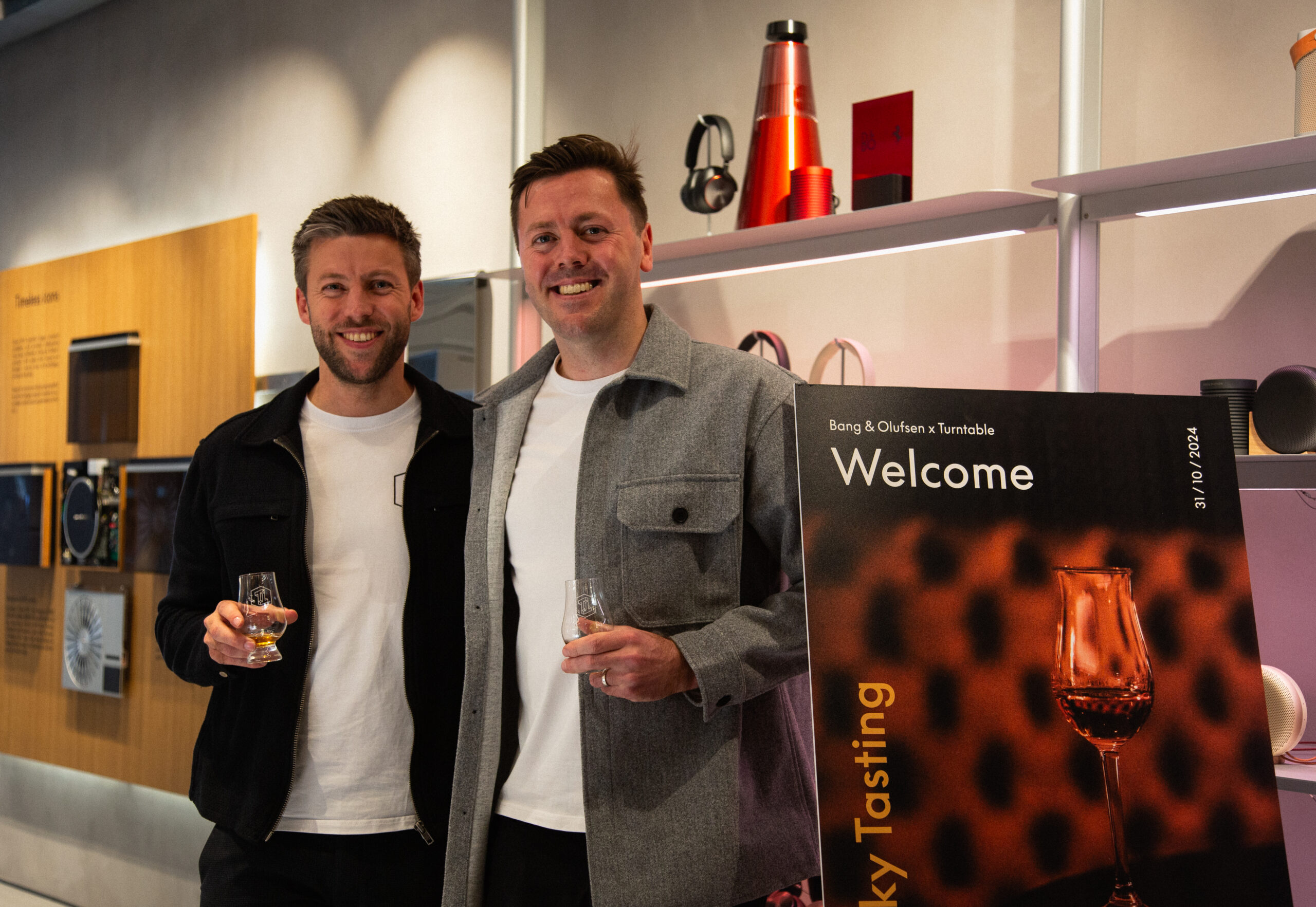
31 jan The story behind Turntable Whisky remixing the world of blended Scotch
Blended Scotch has long lived in the shadow of its single malt counterpart, often seen as a less premium option. But brothers Gordon and Alasdair ‘Ally’ Stevenson, the founders of Turntable Whisky, are on a mission to change that perception. With their deep-rooted passion for whisky and years of experience in the industry, they have set out to create blends that challenge expectations, offering depth, complexity, and innovation.
In this interview, we dive into their journey from whisky enthusiasts to founders, why they chose to focus on blended whisky over single malt, and how they go about sourcing, blending, and aging their unique expressions. We also explore the meaning behind the name Turntable, their thoughts on the future of Scotch whisky, and what’s next for their exciting brand.
Let’s hear it from Gordon and Ally themselves!
Background and Beginnings
Can you tell us a little about your background and how you first became interested in whisky?
Our father, Graham, has worked in the industry for over 30 years, spending most of his career with Inver House Distillers. Whisky was a regular topic of conversation in our house and during my late teenage years I became more and more interested in the industry. I was particularly taken by its collaborative nature – it almost seemed there was an unwritten rule that companies would work together and support each other, with a shared mission to grow the overall category of Scotch whisky.
Was there a specific moment or experience that made you realize you wanted to create your own whisky brand?
Gordon and I always wanted to work together and held ambitions to create our own brand. This dream had been discussed for years, but the point that really kicked us into action was the pandemic. I had a slight apprehension about the risk of starting our own project and felt there would be more security in working for a well-established company. However, when Covid came that changed my mindset. During those first months nobody knew what the future would hold, and which companies would survive or how many jobs might be lost. With that uncertainty, I felt it was time for us to take control of our future. Having worked in the industry for many years, we had a very clear understanding of the importance of stock and long-term planning. We started to acquire casks and haven’t looked back since.
How did your journey in the whisky world shape the vision for Turntable Whisky?
I have been fortunate enough to spend almost 10 years working with an incredibly talented Master Blender and businessman called Billy Walker, at both The BenRiach Distillery Co. and GlenAllachie. Billy’s policies on wood management, cask selection and blending have played a key role in shaping our vision for Turntable. Our focus is very much on quality, focus and transparency. All products are bottled at a minimum of 46% ABV and are natural colour and non-chill filtered. Our philosophy can be summed up in two words – NO SHORTCUTS.
Setting Up Turntable Whisky
What inspired you to start Turntable Whisky, and how did the idea first come to life?
We both felt frustration that there is a perception around the whisky world that the single malt category is where the quality lies, and the blended category is where the volume lies. Blending offers an amazing opportunity for creativity through different flavour combinations. We aim to change the perception that blends are inferior to single malts by focusing on quality, innovation and transparency.
The Scotch whisky market is highly competitive. What made you confident in pursuing this venture?
We haven’t always been confident – there have been plenty of moments we’ve questioned if we’re crazy. We are confident in our experience and felt we had a strong network of relationships both within the industry when it came to sourcing casks and in the international markets when it came to distributing and selling our whiskies. Whilst the market is highly competitive we thought that with Turntable we had a unique story to tell. Challenging the perception surrounding single malts vs blends gives both of us a great deal of energy – we are passionate.
How did you come up with the name “Turntable Whisky,” and does it have a particular significance or story behind it?
A second love beyond the world of whisky for us is also music. We love to explore the connection between whisky and music. Both can take a person to a different time, a different place. We invite people to share where our whiskies take them (and what music they pair them with). Also, as I’ve mentioned, our main ambition is to change the perception that blends are inferior to single malts. Our idea is to turn the tables, flip the record on the ordinary and change the perception.
The Choice for Blended Scotch
Why did you choose to focus on blended Scotch whisky instead of a single malt?
We believe this is an underappreciated category with great potential. Blending opens so many possibilities when it comes to flavour combination and creativity. We thought we could combine this opportunity with the care to detail and transparency more commonly found within the single malt category to create something special.
What do you think are the biggest misconceptions about blended Scotch, and how does Turntable Whisky aim to challenge these perceptions?
We think many people look at the blended category as a mass volume, low quality, easy drinking style meant only for mixing. Interestingly, when blending started it was all about quality, creativity and consistency. The blended category drove the success of Scoth whisky. We believe that as demand has grown over the years, the strategy of the blenders evolved to satisfy that demand. Younger whiskies are used as components, the proportion of grain whisky used has increased and casks are reused many times. These changes mean the style of whisky created today can meet the desired style of a mass market but may be less interesting to the whisky enthusiasts. Blending is an art and we look adopt a strategy that can be more interesting for the whisky enthusiasts.
How do you balance creativity and tradition in your approach to blending?
In some ways we are going back to the concept of the early blending houses and very much looking to history and tradition. We’ve also looked at what we feel are the driving forces behind the incredible growth we’ve seen in the single malt category over the last 30 years. Quality is certainly the driving force, but we also feel that customers today are looking for a connection with the brand. Where is the distillery located, what is the history, who is making the whisky, what cask types have been selected. We are looking to bring this sense of connection to the world of blended whiskies as well by putting a lot of focus on transparency and storytelling. From a branding point of view, we also thought there was an opportunity for us to step away from the traditional look and feel of Scotch whisky to create a modern, bold and colourful brand.
[Interview continues below the picture]

Sourcing and Blending
How do you go about sourcing the whiskies you use in your blends?
We are fortunate to have a fantastic network of highly reputable suppliers across the industry. We are always looking for great quality and value. This can be from all areas – different styles of malt whisky, peated, older grains, etc. Of course, we look to build long-term supply agreements where possible to allow us to develop consistent styles within our core range.
What characteristics do you look for in the components of your blends?
Depth and complexity. We look to nurture each whisky closely and develop the flavours through our wood management program. Each component should bring a different element to the final blend.
Can you take us through your blending process—how do you decide what works together and create harmony in your blends?
We usually have an idea of the flavour profile we are looking to create. The first step would be to look through our database of casks and through experience narrow down to a selection of about 50 casks for sampling. Knowledge of what spirit style to expect from different distilleries, the age of the whisky, what cask type it has been maturing in is all important at this stage. We would sample each of the whiskies to evaluate how they compared to our expectations and then narrow down to about 20 casks before working on different combinations. How the whiskies blend and integrate together (and then also with water) can be quite unpredictable.
Do you age the blend after combining the whiskies, or is the process completed once the blend is created?
We would marry the whiskies slightly above the final bottling strength for 3 months.
Innovation and Inspiration
How do you approach innovation in your blends while respecting Scotch whisky traditions?
We’re always thinking of ways to innovate. I think the main point here is that we are looking to innovate in pursuit of interesting and outstanding flavours, not just for innovation’s sake. We try to remove as many barriers to flavour creativity as possible. Being a Blending House already allows us to be very versatile and creative, but an example of taking this one step further would be on our Collaboration releases – working with distilleries beyond Scotland to create some interesting cross-border blends.
Does music play a role in inspiring the creative process behind Turntable Whisky, given the name?
The whisky always comes first. Pairing with music is good fun and allows us to connect with our supporters in a different way. There is no right answer when it comes to the music connection.
Are there any other creative or cultural influences that guide your whisky-making philosophy?
When we were brainstorming early ideas for Turntable I found that I was drawn by the 1960s culture – great whisky, music, the counterculture movement and challenging the status quo. As mentioned earlier, when it comes to our whisky-making philosophy, a lot of that has been influenced from my time working with Billy Walker.
Looking to the Future
Where do you see Turntable Whisky in the next five to ten years?
I hope we have built on the strong start we have made in building a reputation for offering quality. We are in 15 markets today and whilst we don’t anticipate the number of markets growing too quickly, we are more focused on supporting our existing partners to establish Turntable in their market. Ideally, we would like to look at creating a small blending experience for hosting customers in Scotland.
How do you think Scotch whisky as a whole will evolve in the coming years, and what role do you hope to play in that evolution?
As an industry we’ve faced more challenging market conditions in the last 18 months than for many years previously. I think offering excellent quality and value will be key. We hope that anyone who purchases a Turntable product will think that it was excellent value when reflecting.
Are there any trends or challenges in the industry that excite or concern you?
Since launching Turntable, we’ve been encouraged at how open-minded people have been to our approach to blending. There is still some resistance in certain markets, but if we have an opportunity to let people taste our whiskies and tell our story we’ve seen great sales and ongoing support. I think people are willing to look in different areas if quality and value can be offered.
Fun and Personal
If Turntable Whisky had a theme song, what would it be and why?
Bachman-Turner Overdrive – Ain’t seen nothin’ yet.
We’re just getting started 😊
What’s the one whisky in your collection (aside from Turntable) that you couldn’t live without?
Old Pulteney 12YO – this is the whisky we grew up with in the house and one we would always go back to.
If you could collaborate with any other whisky producer or brand, who would it be and what kind of whisky would you create together?
We have loads of ideas in this area. We’ve worked with Starward from Australia and Dingle from Ireland on our Collaborations and both were great experiences. The idea is always to work with likeminded teams to create something special.
For fun—what’s the perfect setting to enjoy a glass of Turntable Whisky?
One of the nice things about being a Blending House is we have such a diverse range of styles and believe each of these whiskies could be enjoyed in a different setting. For now, I’d love to be enjoying a Paradise Funk in one of Japan’s Jazz Kissas.
Turntbale Whisky is imported in The Netherlands by Craft Spirits Nederland.





Geen reactie's